I guess we wouldn’t be here on this site if John Keats himself wasn’t an intriguing person. Fiction authors have found this to be so, as well. Here are some examples – and this post is definitely a work in progress, so I’d love to hear about any more!
“The Invention of Dr Cake” by Andrew Motion
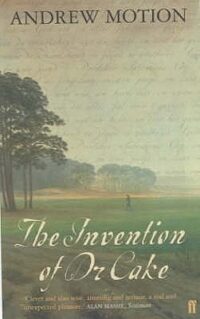
What is the truth about the mysterious Dr Cake? Why, at his funeral, is there no name on the brass plate so ostentatiously screwed into his coffin-lid? Andrew Motion, poet laureate, has written a novel about poets and the afterlife.
Where better to start than with Andrew Motion, not only poet laureate but also Keats’ biographer?
However, this book leaves me feeling both satisfied and dissatisfied… but then I wonder if that isn’t the point – or at least one of the many points. This slim novel (142 pages) with its straightforward style is deceptive in that it is crammed full of thought-provoking ideas.
The story begins well-grounded in reality with Motion reflecting on the nature of biography, and specifically what truths the discipline can tell and what truths it leaves out, as well as what is known and what is unknowable about a life. ‘Recently’, Motion declares, ‘I’ve cast around for new ways of doing things.’
Within a couple of paragraphs we are matter-of-factly introduced to Dr William Tabor (1802-1851), who is an invention of Motion’s, though so perfectly grounded in his life and times that one wonders for a while why one hasn’t heard mention of him before in other scholarly works. In turn, Dr Tabor introduces us to Dr John Cake, likewise an invention.
Motion explores the notion that Keats survived a crisis of health in Rome, but let it be thought that he has died, and took the opportunity to reinvent himself. When he eventually returned to England, it was to live and work as Dr Cake, in a village in Essex. His friends and family were left in ignorance to grieve for Keats. When we meet him, some years later, he is finally dying.
“Aphrodite’s Hat” by Salley Vickers
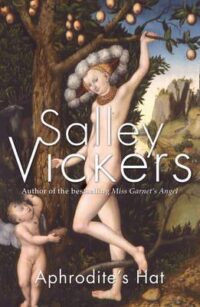
A wonderful collection of stories from the much-loved Salley Vickers.
The stories in this long-awaited collection by Salley Vickers all deal with psychological aspects of love: love given and withheld, love craved and lost, love met and disappointed; the differing shades of loves between friends, between parents and children, between children and other adults; love even, in one case, for a pet.
Psychologically acute, sharply written in lucid and often witty prose, these stories, set in Venice, Greece and Rome as well as London and the English countryside, take us into the complex geography of the human heart. Sometimes joyous and humorous, sometimes melancholy and poignant, this collection confirms Salley Vickers’ reputation as one of our most subtle and engaging writers.
Seventeen terrific short stories from one of my favourite authors. I read them all in one day, which probably isn’t wise, but there will be time anon to revisit and retreasure.
Vickers is excellent at deftly setting up the world of a story, and conveying character and emotion. I had a couple of stumbles in the setups and a couple of dissatisfactions with the conclusions, but surely the wonder is that it was only a couple! It might even be churlish to mention them here, but the thing is this: Vickers isn’t perfect, but she’s damned close, and – no matter what – she will always make me think and feel.
This tome is included here as the last (rather short) story, “The Fall of a Sparrow”, focusses on Keats.
“Hyperion” by Dan Simmons
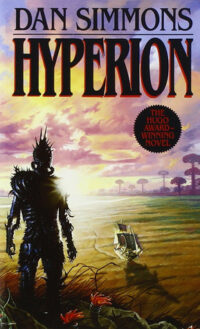
On the world called Hyperion, beyond the law of the Hegemony of Man, there waits the creature called the Shrike. There are those who worship it. There are those who fear it. And there are those who have vowed to destroy it. In the Valley of the Time Tombs, where huge, brooding structures move backward through time, the Shrike waits for them all. On the eve of Armageddon, with the entire galaxy at war, seven pilgrims set forth on a final voyage to Hyperion seeking the answers to the unsolved riddles of their lives. Each carries a desperate hope—and a terrible secret. And one may hold the fate of humanity in his hands.
This amazing novel was the rather unexpected path that led me to John Keats! In this futuristic tale, the historical Keats has been cloned and augmented as a ‘cybrid’, and goes on an adventure with a detective named Brawne Lamia. I was intrigued enough to want to know more, about both the man himself and the letters he wrote.
Despite him being a secondary character, Keats really became three-dimensional in my first readings. And Dan Simmons obviously considered him vital enough to name this and the “Endymion” sequels in honour of Keats’ poems.
“The Fine Point of His Soul” by Julie Bozza
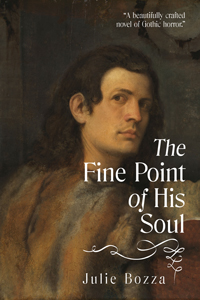
He was the shameful cause of his sister Elena’s death and he stole state papers from England, yet Adrian Hart is feted by the best of society in Rome, and boldly dubs himself ‘Iago’. Determined to avenge Elena, his unrequited love, Lieutenant Andrew Sullivan asks the advice of poet and Shakespearian John Keats, and his artist friend Severn. Soon Percy and Mary Shelley join them, then Lord Byron and his servant Fletcher. But how can the seven of them work against this man, when they can’t even agree what he is? The atheist Shelley insists that Hart is an ordinary man, while Byron becomes convinced he’s the Devil incarnate, and Keats flirts with the idea that he’s Dionysius…
As death and despair follow in Hart’s wake, Sullivan knows he must do something to stop Hart before even Sullivan himself succumbs – but what…?
And now I will overcome my bashfulness and present my own novel… It’s a Gothic alternate history that asks “What if…?” What if Keats did indeed start recovering his health in Rome? What if he had an adventure instead?
Here is the feisty young man so many of us know and love…
“The Stress of Her Regard” by Tim Powers
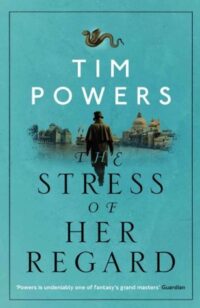
When Michael Crawford discovers his bride brutally murdered in their wedding bed, he is forced to flee not only to prove his innocence but to avoid the deadly embrace of a vampire who has claimed him as her true bridegroom.
It took me a while to finish this one, partly because it’s not my usual fare, and partly because the book takes what feels like a rather problematic view of women.
I wanted to read it because it uses the lives of the Romantic poets Byron, Shelley and Keats as the framework for a tale involving lamias (lamiae?) and vampires. And I have to say that the story and its elements dovetailed very neatly indeed with the poets’ lives as well as their poetry. There was only one convenient shift of an event to a different time (that I caught), but that was understandable for story-related purposes. In fact, sometimes this story fit so well that I exclaimed ‘O ho!’ or had a moment in which I wondered if it wasn’t actually so.
My favourite fellow is Keats, and I thought he was very well written, as were Shelley and Byron. Each man’s loyalties to a tangle of family and friends was acknowledged, though many of these potential extra characters were barely a name on the page. (A very minor detail I found interesting: Powers has Shelley as blond, when the only portrait we have of him shows him with dark brown hair. But I can’t tell you how difficult it was for me to write him with brown hair rather than blond. I blame Julian Sands!) Keats is nobly self-sacrificing in order to prevent harm to others, which I felt was distressingly true to his strong sense of morals.
As for the rest of the novel, perhaps it’s not for me to comment. I found it rather long and needlessly convoluted, but then if this is your sort of thing, perhaps that will instead translate as ‘full and rich’. I have to say I almost gave up on it a couple of times, as it struck me that this ‘man vs lamia’ thing was way too misogynistic if there weren’t balancing factors. Such a point of view might be realistic enough for the characters in their time period, but needs to be handled carefully for the tastes and mores of modern readers. But then at last (past the halfway point) the original character Josephine became rather more interesting, and for better or worse I kept going.
In sum: An ambitious work that succeeds on its own terms. And hurrah for Keats! But based on purely personal taste, I don’t think I’ll be bothering with the sequel (which focuses on the Rosettis).
“A Night of Blacker Darkness” by Dan Wells
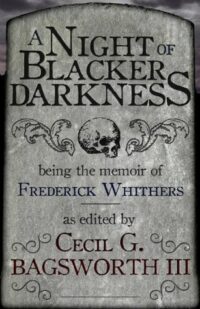
Wrongly imprisoned, Frederick Whithers is desperate to commit the crime he’s already being punished for: defrauding the bank out of a vast inheritance. He fakes his death to escape, but when he’s seen climbing out of a coffin everyone assumes he’s a vampire; when he shows none of the traditional vampire weaknesses, they decide he must be the Great One, the most powerful vampire in the history of the world.
Half horror and half farce, Frederick’s tale is an ever-growing avalanche of bankers, constables, graverobbers, poets, ghouls, morticians, vampires, vampire hunters, not to mention some very unfortunate rabbits. With a string of allies even more unlikely than his enemies, can Frederick stay alive long enough to claim his (well, somebody’s) money? And if he can’t, which of his innumerable enemies will get to him first?
A silly and amusing tale of fraud, vampires, body-snatching, and other acts of derring-do, set in Bath and London. I read it for the sake of a fictional John Keats, who was actually rather cool, and I loved the tone and content of all he said (though alas we didn’t hear enough from him in the latter parts of the book).
Recommended if you want a bit of nonsensical fun (and don’t mind some rather poor eBook formatting).
